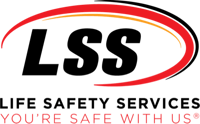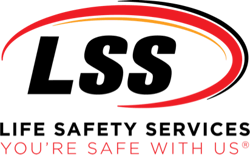1. What is the contractor’s experience?
When researching different inspection contractors to perform the passive fire protection inspection and maintenance services in your facility, be sure to check up on what type of experience they have working in your field. Different types of facilities require different skill sets, and the contractor you choose should have experience working in facilities like yours. LSS Life Safety Services has performed thousands of projects throughout the United States and Canada. Ranging from projects for Fortune 500 companies, College and Universities, Hotels, High-Rises and over 4,000 Healthcare facilities nationwide.
2. How is their reputation?
It’s one thing to own a business and do the work, but it’s a whole other animal to do the work and have a strong reputation from doing it WELL. Make sure your contractor has a strong resume and ASK FOR REFERRALS. A good contractor that you can trust will come up time and time again when you ask your colleagues for suggestions on who to perform the work.
3. Does the company specialize in these services?
Companies that specialize in fire & smoke damper inspections, fire door inspections and firestop survey/installation know what to look for in the field and will complete a thorough evaluation of your passive fire protection system. Our team is familiar with the codes that require the maintenance and have performed thorough inspections in well over 4,000 facilities – thus, lessening the liability for all parties involved.
4. Can the contractor provide references of projects of similar size and scope?
Always, always, always ask for references. References show the true competency of the contractor you have chosen.
5. What kind of training do the inspectors have?
Our manufacturer and OSHA training for the service technicians helps to reduce on the job injuries and ensure the work is completed in a timely fashion. Technicians are put through background checks and drug screening, infection control training, confided space training, customer skills training, manufacturer training and NFPA code training just to name a few. Additionally, some of the top fire safety product manufacturers provide our service technicians with industry leading training courses and certifications.
6. Are they insured?
There are so many different types of insurance out there – always ask for a Certificate of Insurance from the contractor you choose and ask them about Error and Omission Insurance, Professional General Liability, Excess Liability/Umbrella Liability and Workers Comp. Our company carries a very high amount of insurance because of the type of machinery that can be found in hospitals or other types of facilities. Make sure the contractor you are working with can cover your assets should something happen on site.
7. How long has the company been doing this?
LSS just celebrated their tenth year in business and that’s something we are very proud of. Our business grew substantially during and on the heels of a major recession – not many passive fire protection companies out there can say that.
We’ve been through several code adoptions/changes and know the history of passive fire protection when it comes to the Joint Commission as well as non-healthcare facilities that have adopted the International Building and Fire Codes. Our history in the business has equipped us with the knowledge needed to help you better protect your facility.
8. Does the company have a quality assurance program?
Maintaining a high quality standard should be tops of your contractor’s list. LSS’ QC program utilizes surprise random inspections by our QC manager and with the utilization of digital documentation to ensure the inspection are being carried out with the quality levels LSS demands. This ensures that our customers don’t have to worry about re-work and business disruptions caused by poor inspection or installation quality.
9. Do they provide digital documentation to hold them accountable for the work they performed?
Photos taken of every device before and after inspection ensure that the inspection was actually done and gives Authorities Having Jurisdiction’s (AHJ) an easy way to verify that the work was completed and reduces your liability should an actual fire take place.
10. Is there a report provided at the conclusion of the work performed?
There are challenges in keeping up with inspection reports and records and having them available for your AHJ. That’s why LSS has created our own web-based inspection software, LSS Site Surveyor. We offer you the ability to support sustainability by allowing you to eliminate paper inspection records once and for all. Additionally, our inspection software produces the most comprehensive inspection report in the business – all on-line, all easy to use, all ready to present to your AHJ with the click of a mouse.
Bottom line – if you are contracting your passive fire protection inspection or installation services out, be thorough in your selection process. Not all companies are apples to apples and many companies in our business will over promise to get your business and under deliver when it’s time to actually do the work. Be selective, be cognizant, and be picky. Ask questions – the right questions – and you should end up with a strong partner in keeping your facility in compliance with local and state building codes.

